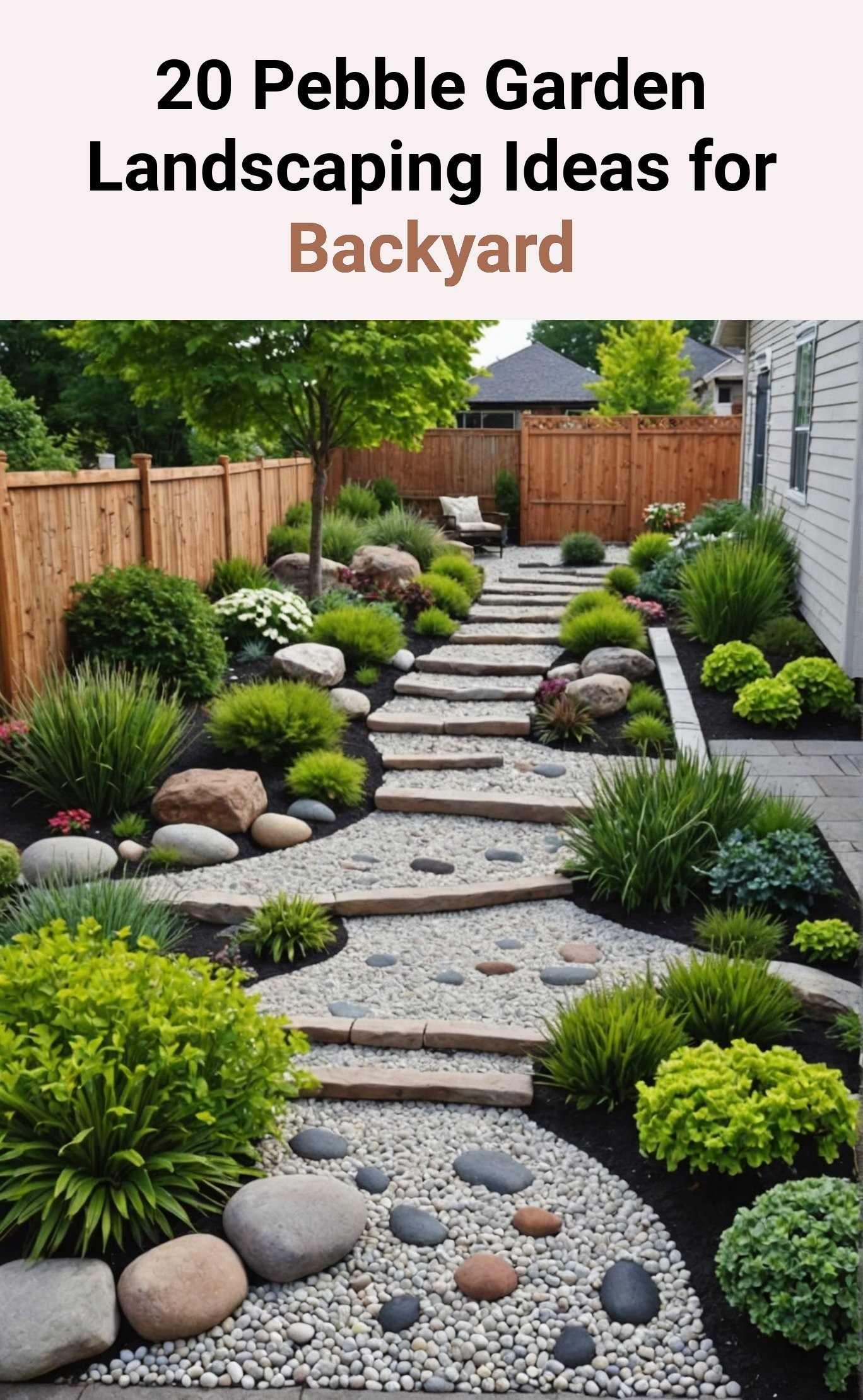Beautiful Plants For Your Interior
Beautiful Plants For Your Interior
Transform your backyard into a serene oasis with these 20 creative pebble garden landscaping ideas.
From winding pebble pathways to tranquil Zen gardens and vibrant mosaics, there’s a design to suit every taste.
Let’s explore how you can elevate your outdoor space with the beauty and versatility of pebbles.
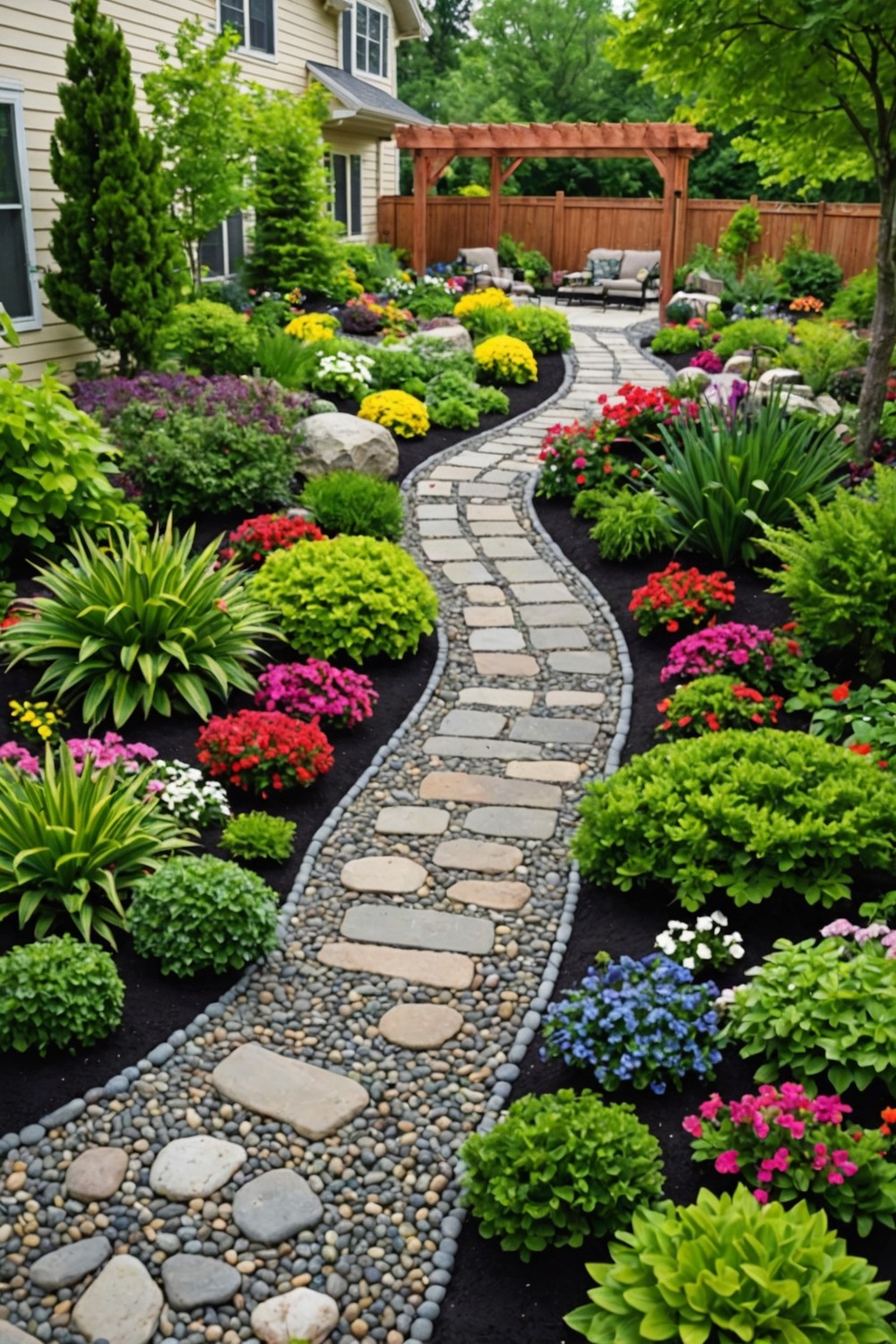
Creating a pebble pathway adds charm and functionality to your garden.
Start by selecting a clear path that connects key areas, like your patio or garden beds.
Level the ground and outline your pathway with stakes and string for guidance.
Lay down landscaping fabric to prevent weeds, then fill the pathway with your chosen pebbles, ensuring an even distribution.
This project not only enhances your garden’s aesthetic but also offers a stable surface for walking.
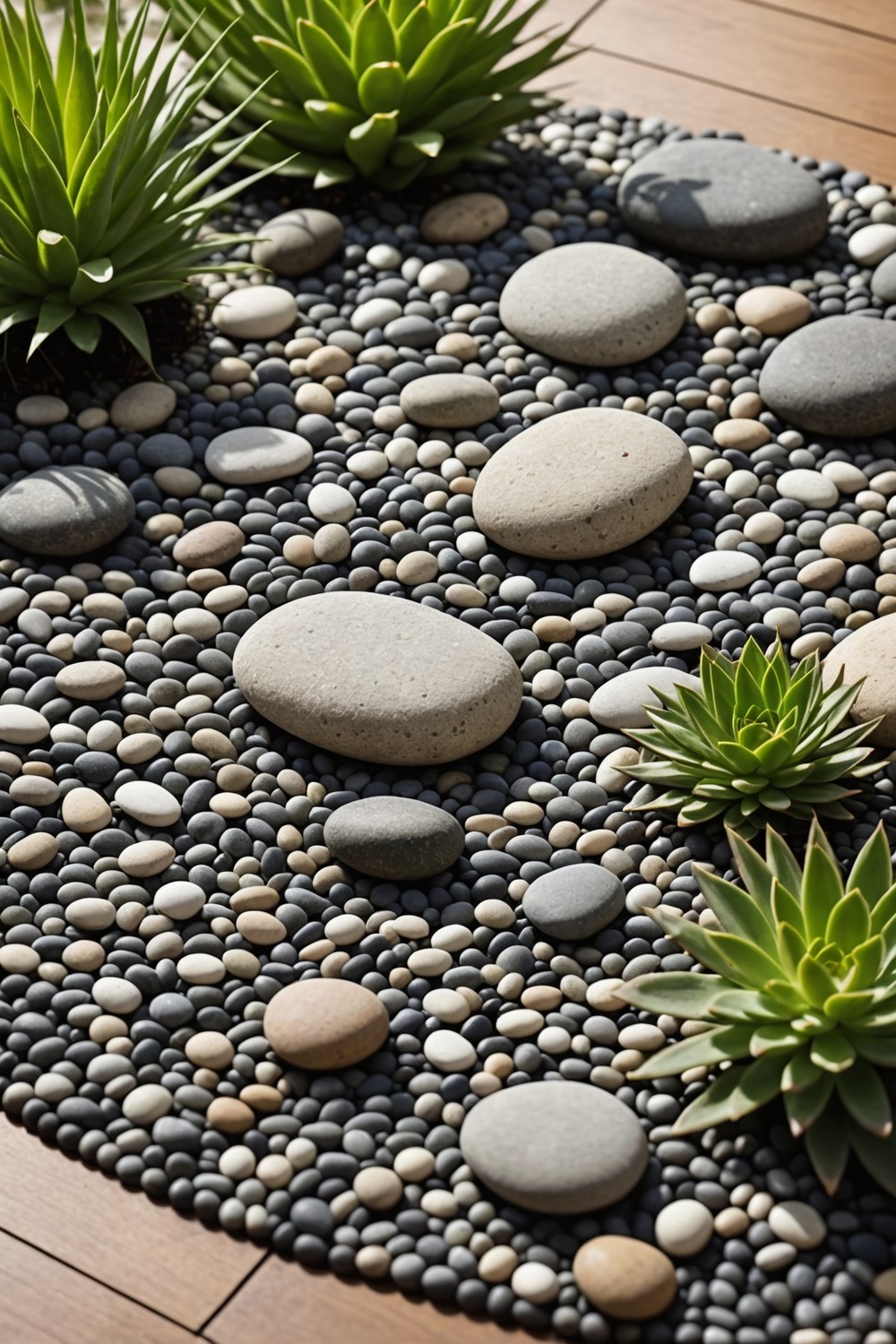
A Pebble Zen Garden is all about simplicity and tranquility.
Start by selecting a flat surface where you can lay your pebbles, ideally in a location that receives ample sunlight.
Choose your pebbles—smooth, round ones create a soothing effect, while varied colors add visual interest.
Arrange larger stones or boulders thoughtfully for balance, and consider incorporating small plants or succulents for a touch of greenery.
Raking patterns into the pebbles can enhance the meditative quality of the space, inviting relaxation and reflection.
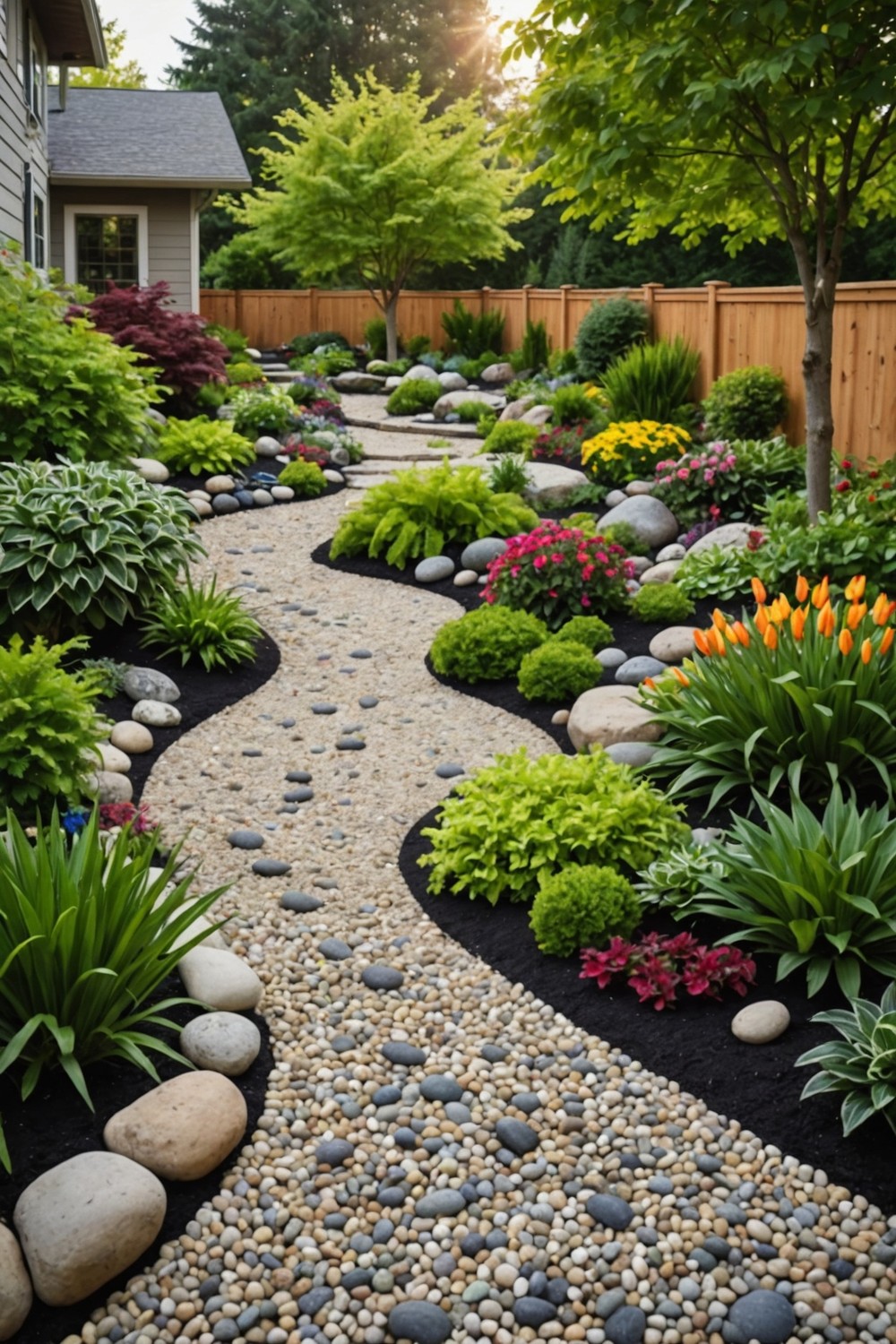
Using pebbles for ground cover is an excellent way to enhance your garden’s aesthetics while providing practical benefits.
They offer excellent drainage, preventing water from pooling and helping to keep your plants healthy.
Pebbles also suppress weeds, cutting down on maintenance.
Available in various sizes and colors, they can be arranged creatively to add texture and visual interest to your garden design.
Pairing pebbles with pathways or flower beds can create a harmonious indoor-outdoor flow, inviting exploration.
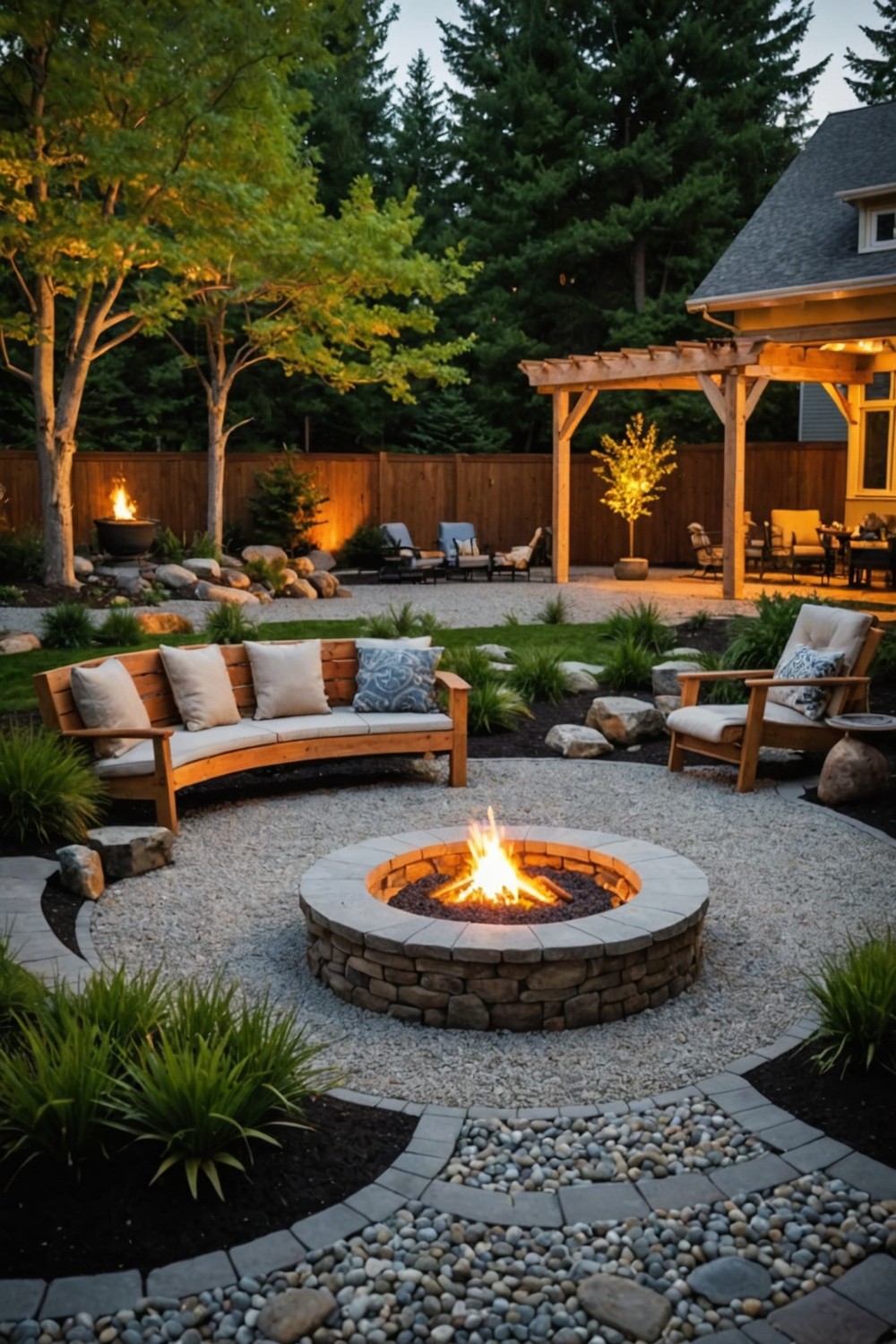
Constructing a pebble fire pit area creates a cozy focal point for gatherings and enhances the outdoor ambiance. Start by choosing a flat, dry location and ensure it’s a safe distance from flammable structures.
Dig out the designated area, then lay a fire pit base made of gravel or sand for stability.
Surround the pit with larger pebbles for an attractive outline and add smaller pebbles inside for cleanup ease. Incorporate comfortable seating and maybe some lighting to complete your inviting oasis.
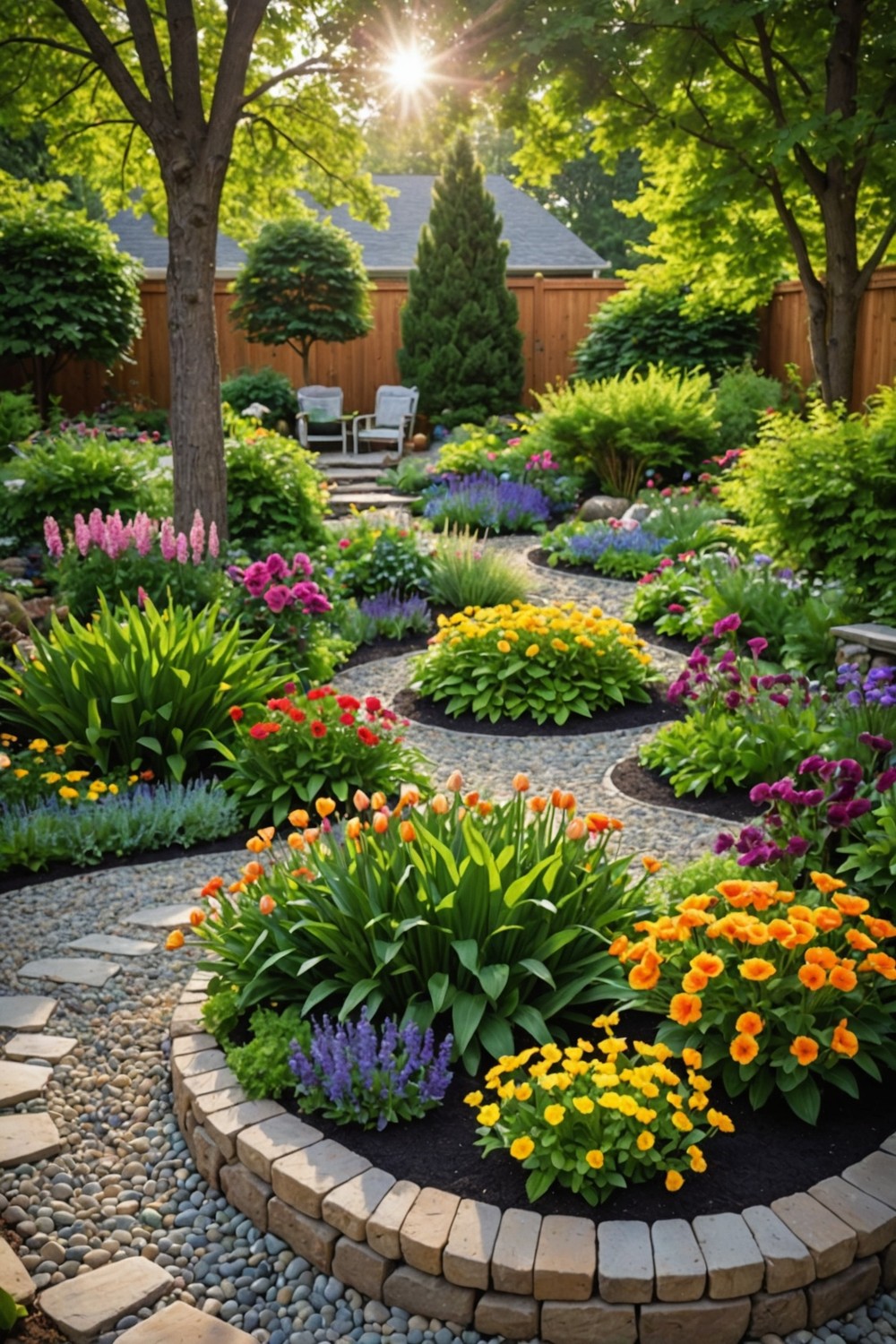
Incorporating pebbles in raised garden beds adds both aesthetic appeal and functionality.
Pebbles can serve as a natural mulch, helping to retain soil moisture while suppressing weeds.
They also enhance drainage, preventing waterlogging of roots.
Consider mixing pebbles with soil or placing them along the edges of the garden bed for a polished look.
This combination not only looks great but also supports healthy plant growth, creating a vibrant garden space.
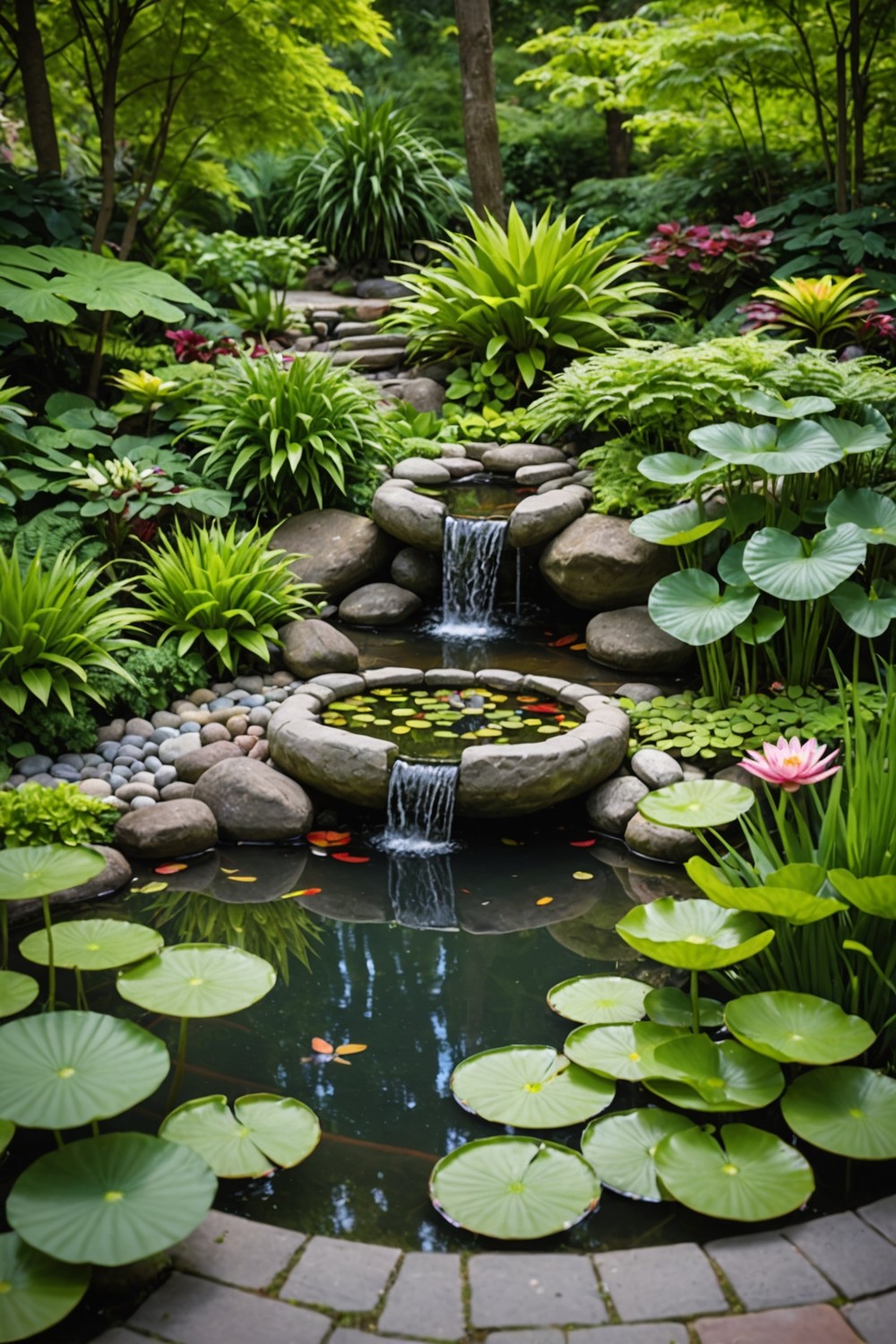
Designing a pebble water feature involves creating a serene oasis that enhances your garden’s atmosphere. Start by selecting an appropriate location, preferably in a spot that receives some shade to prevent excessive algae growth.
Choose a fountain or pond design that complements your garden style, such as a small pond encircled by pebbles or a bubbling fountain.
Use various sizes of pebbles to add texture and visual interest, layering them around the water source. Incorporate aquatic plants like water lilies or ferns for added greenery and a natural feel.
Finally, ensure the water feature has proper filtration and circulation to maintain crystal-clear water and a peaceful ambiance.
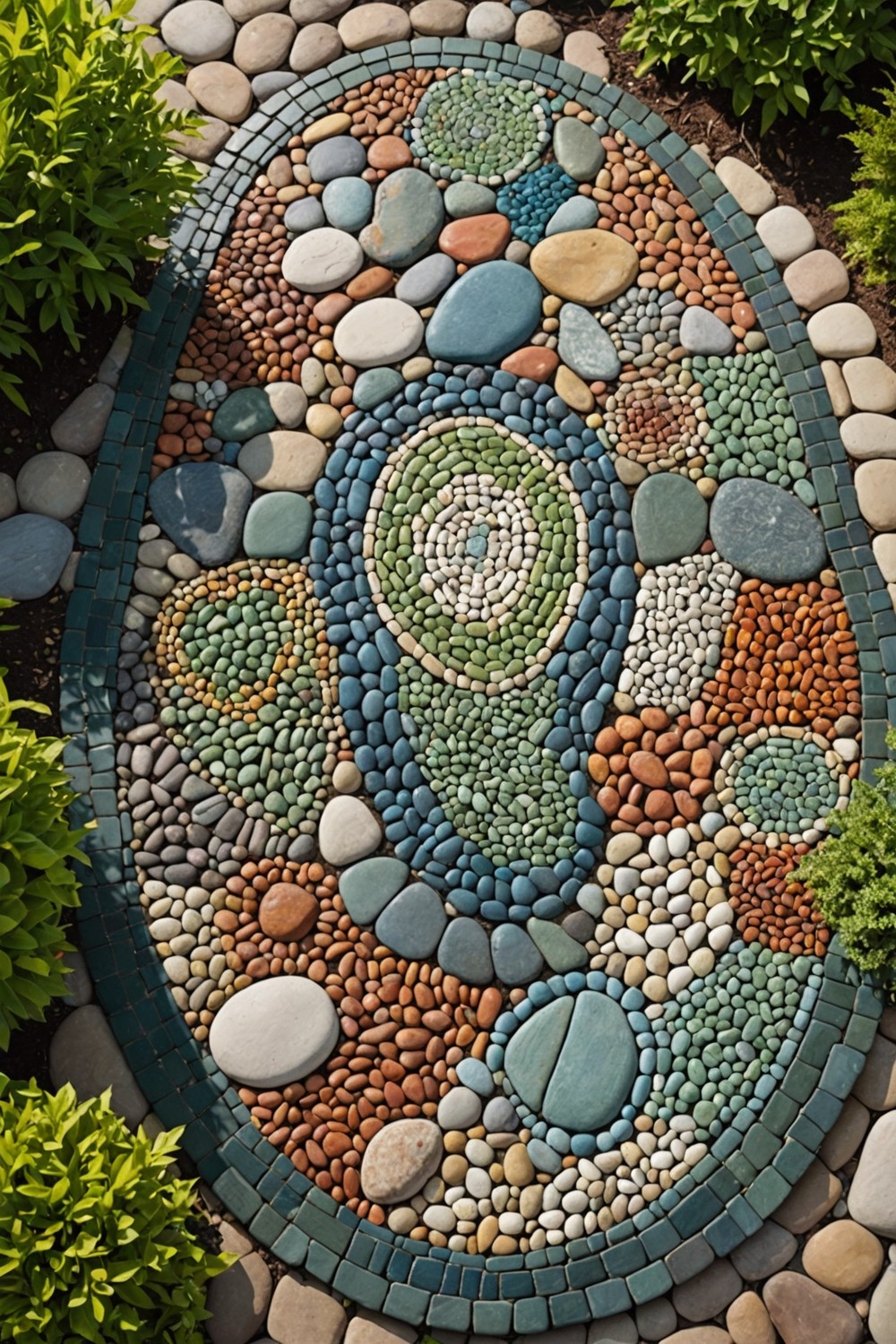
Creating a mosaic pebble patio involves arranging different sized pebbles in a unique design. Start by selecting a variety of pebbles in different colors and shapes to enhance visual interest.
Lay out your chosen design on the ground, ensuring the pebbles fit together snugly.
Once you’re satisfied with the layout, secure them using a suitable adhesive or mortar. Allow it to dry thoroughly, creating a beautiful, durable outdoor space that’s perfect for gatherings or relaxation.
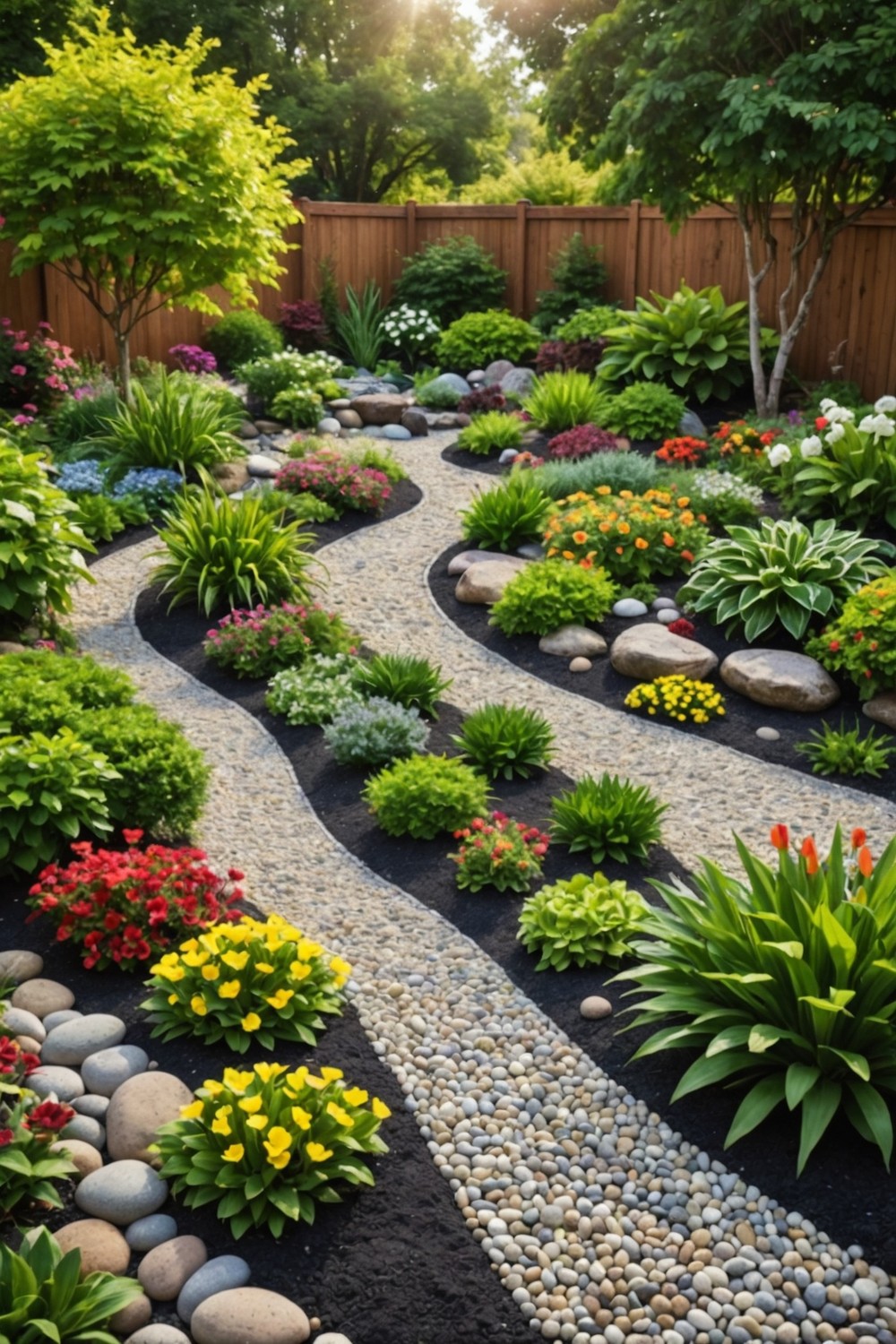
Colored pebbles can create a stunning and unique border for your garden. By choosing a variety of colors and sizes, you can establish clear boundaries for different sections of your landscape.
These pebbles not only serve a practical purpose but also add visual interest, enhancing the overall aesthetic of your garden.
Arrange them in patterns or use a mix of hues to complement your plants and pathways, making your outdoor space feel more inviting and cheerful.
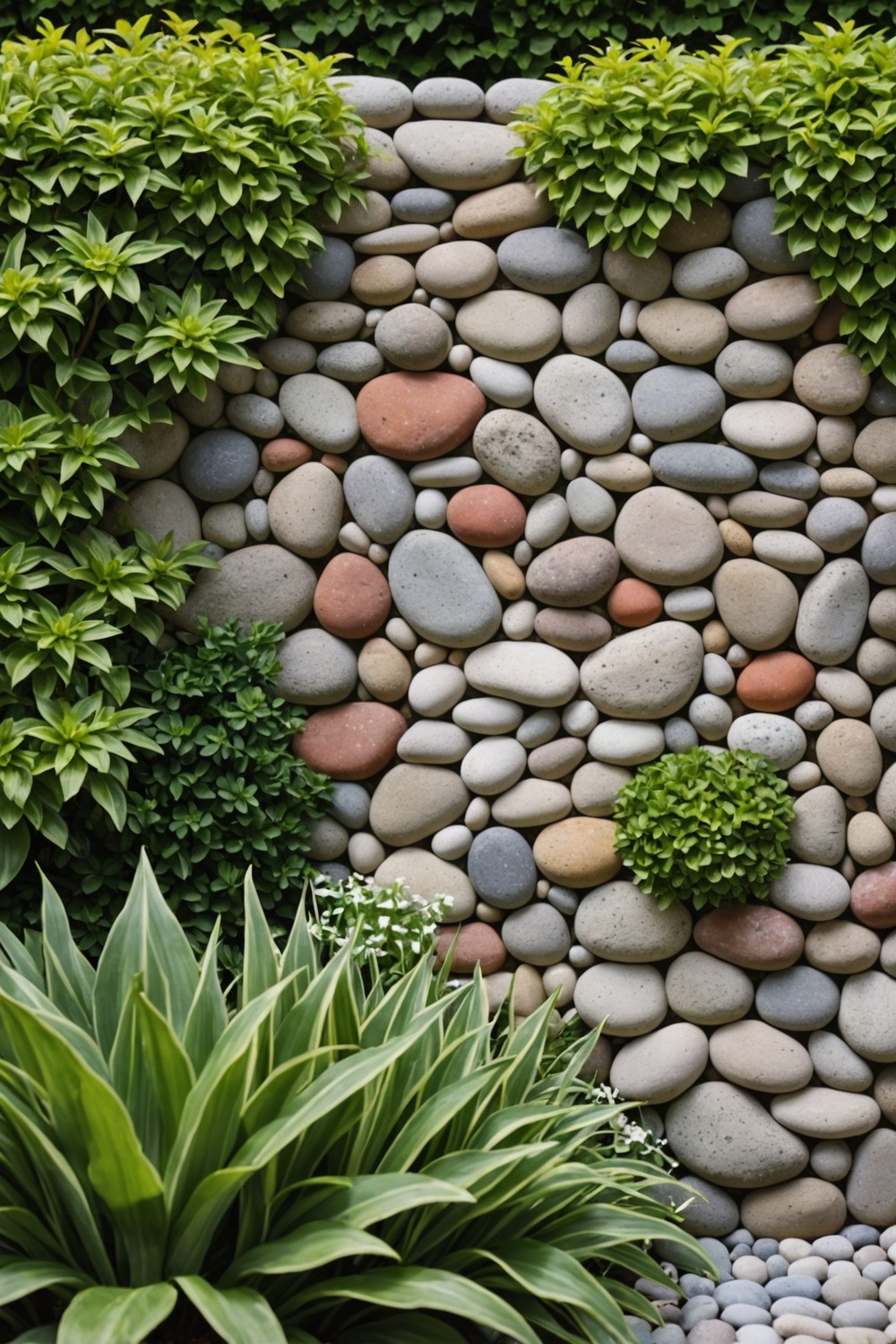
Forming a pebble rock wall adds texture and visual interest to your garden. Start by selecting smooth pebbles in various sizes for a natural look.
Dig a trench for the foundation, ensuring it’s level and stable.
Layer smaller stones at the base and gradually place larger stones above, securing them with mortar or soil between layers. This structure can act as a border, a raised bed, or simply an attractive feature in your landscape, blending seamlessly with the surrounding environment.
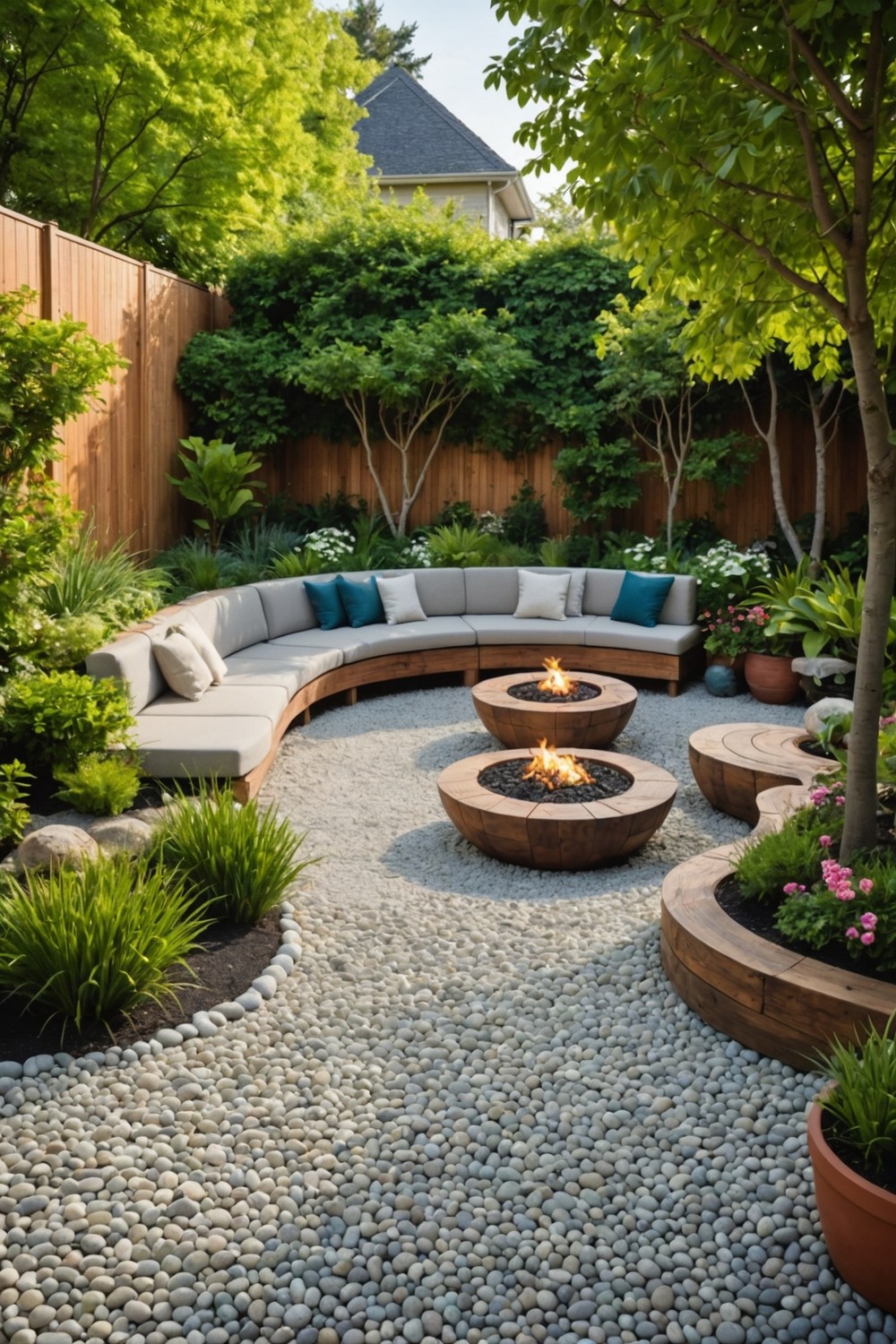
A pebble seating area brings a unique touch to your outdoor space.
Start by selecting a flat, even surface for the seating arrangement, ensuring it’s comfortable and safe.
Use larger, smooth pebbles for the perimeter to create a natural border and smaller pebbles to fill in the gaps.
Consider adding patio or garden furniture such as benches or cushions that blend seamlessly with the pebble theme.
Incorporating surrounding plants can enhance the area, providing a peaceful retreat for relaxation or social gatherings.
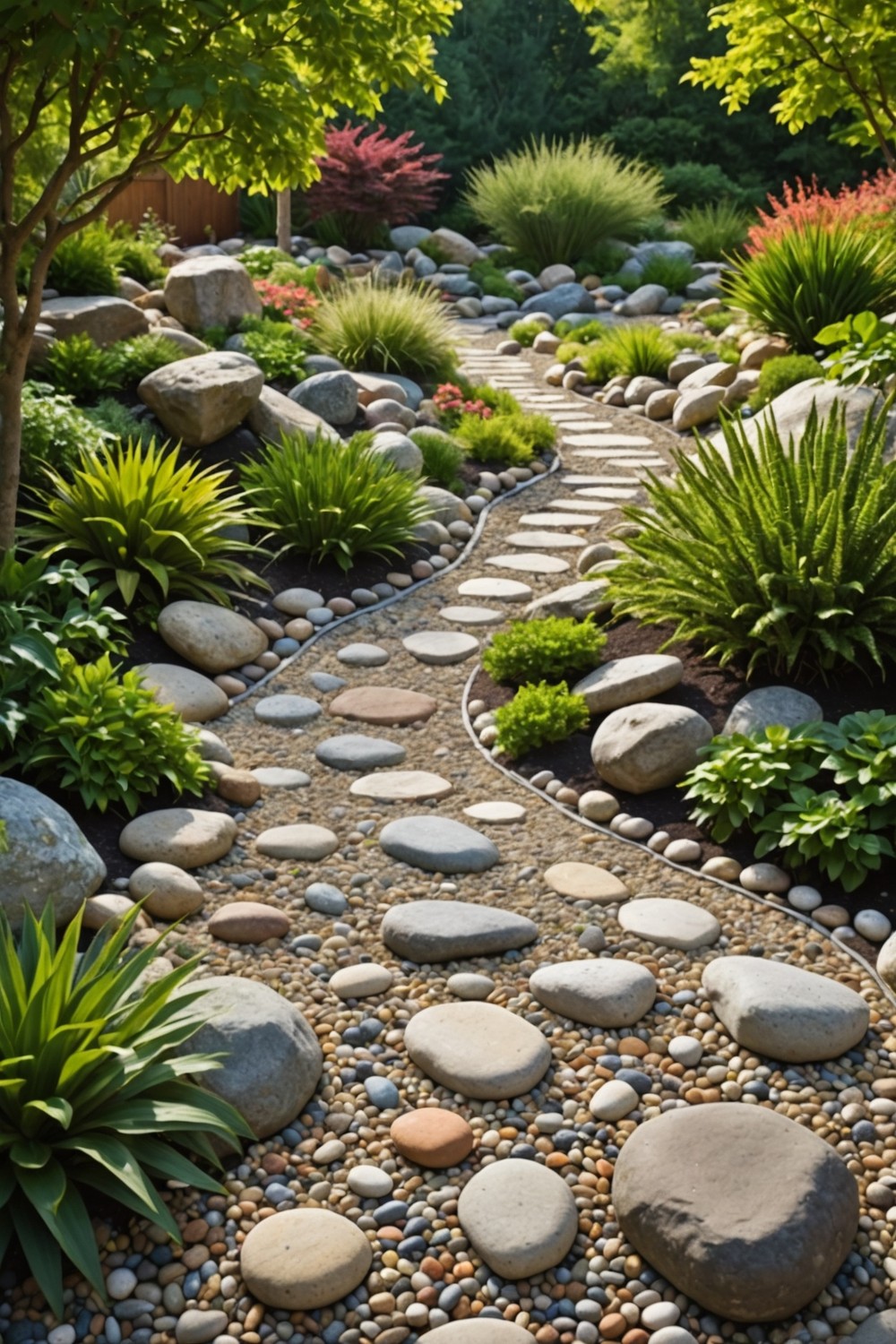
Integrating pebbles into a rock garden adds texture and contrast, enhancing its visual appeal. Start by choosing a variety of pebble sizes and colors that complement the existing rocks and plants.
Spread the pebbles in defined areas, such as pathways or between larger stones, to create a natural look.
These pebbles can also help with drainage and reduce weed growth. Mixing pebbles with other materials like gravel or sand can further enrich the garden’s design, creating a harmonious blend of elements.
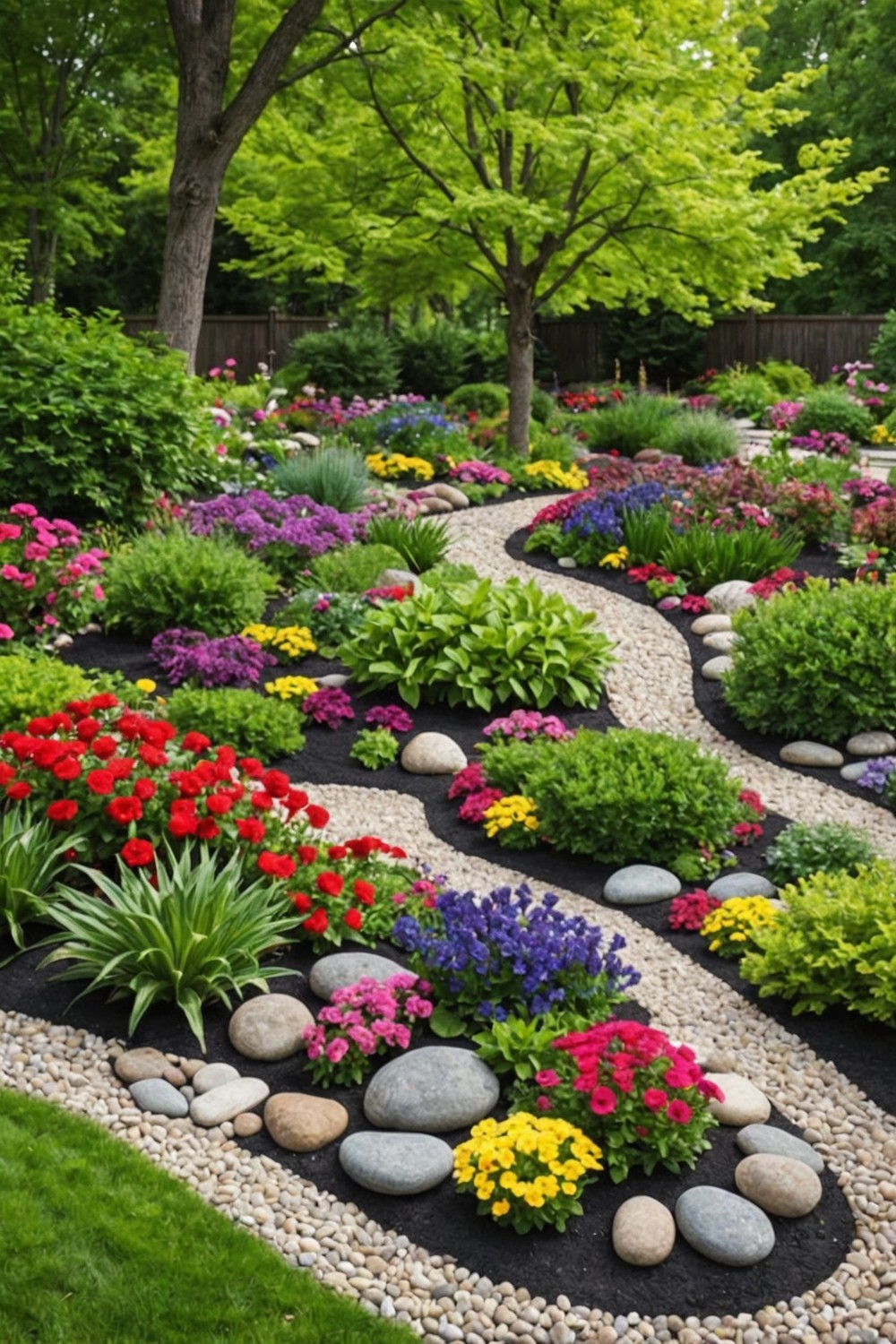
Using pebbles to define flower beds adds texture and visual interest to your garden. They create a natural border that not only highlights your plants but also helps with weed control and soil moisture retention.
Choose pebbles that complement your flowers while staying within the color palette of your garden.
Arranging the pebbles in a thoughtful pattern can enhance the overall aesthetic, guiding the eye and creating a defined space that separates the flower beds from the surrounding lawn or paths.
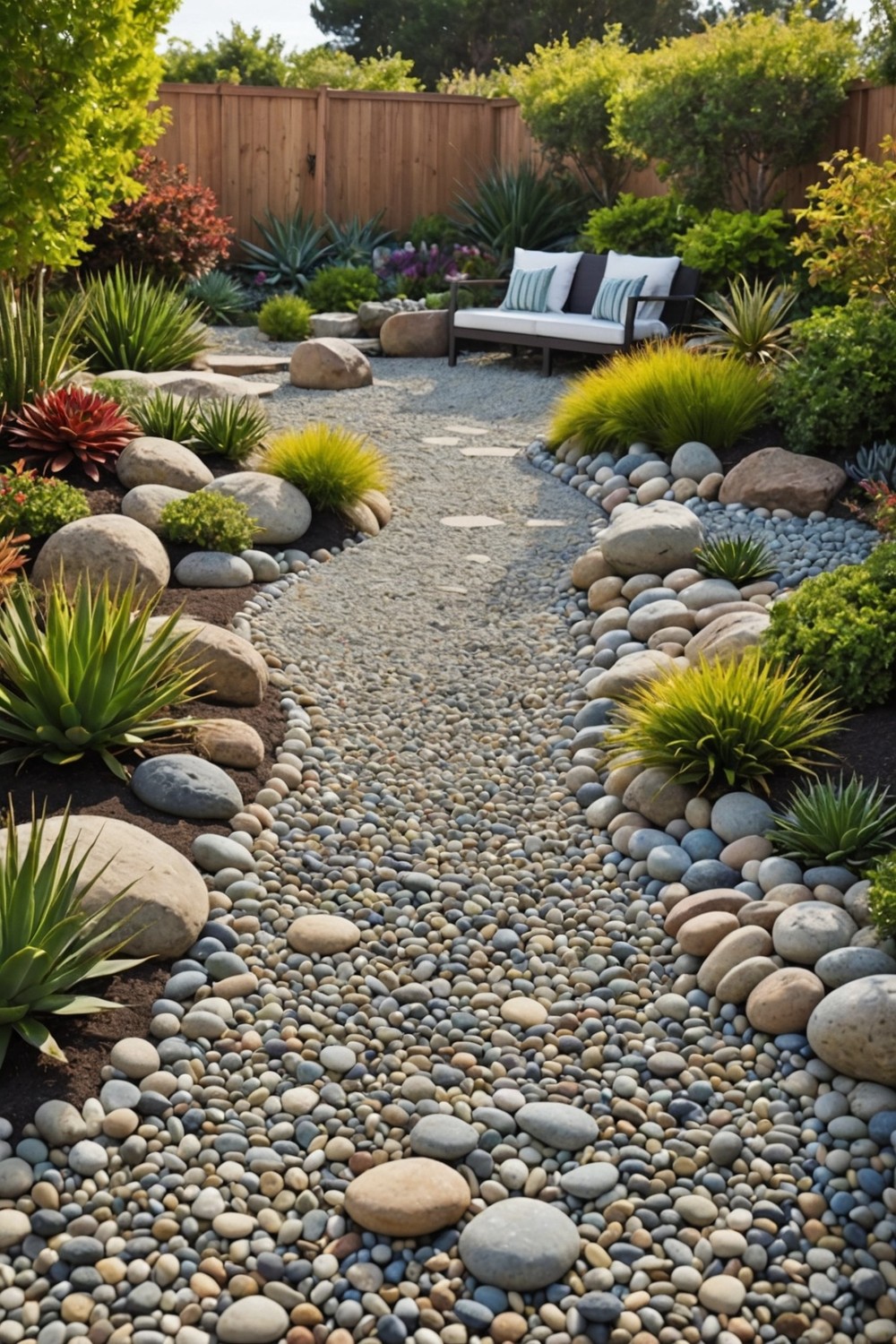
Creating a pebble beach area adds a unique touch to your backyard, resembling a serene coastal environment.
Start by selecting a flat area with good drainage.
Lay down landscape fabric to prevent weeds.
Fill the designated space with a mix of pebbles in different sizes and colors for a natural appearance.
Introduce larger stones or boulders as accents to add depth.
Surround the area with plants that thrive in sandy conditions, such as succulents or ornamental grasses, enhancing the beach-like feel while maintaining a low-maintenance landscape.
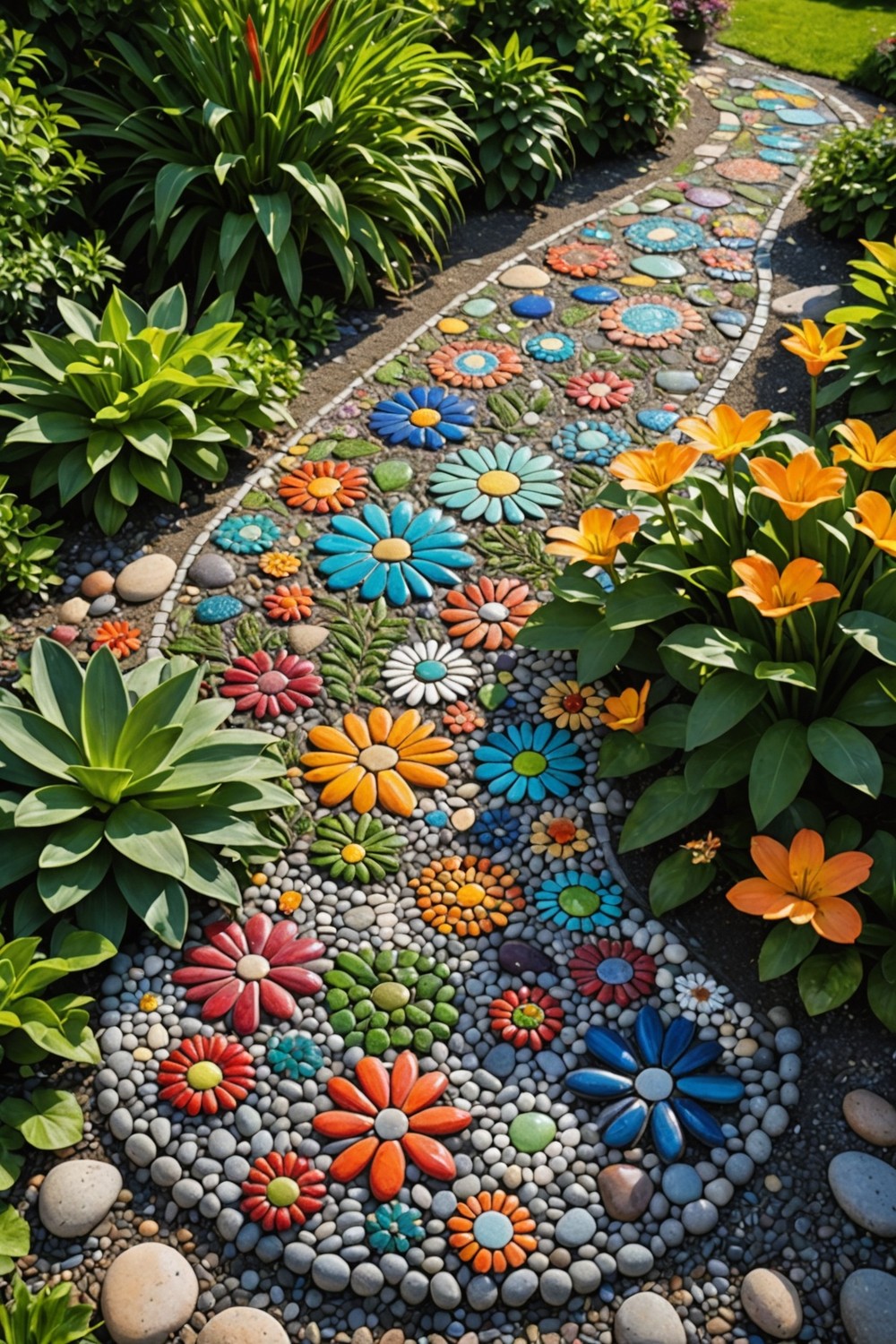
A pebble mosaic art feature adds a unique artistic touch to your garden. Start by designing a pattern or image you want to create.
Gather different colors and sizes of pebbles to bring your vision to life.
Prepare a base, like a piece of plywood or a concrete slab, and use adhesive to secure the pebbles in place. Once set, fill in any gaps with grout for a polished finish.
This art piece can serve as a stunning focal point, enhancing the beauty of your outdoor space.
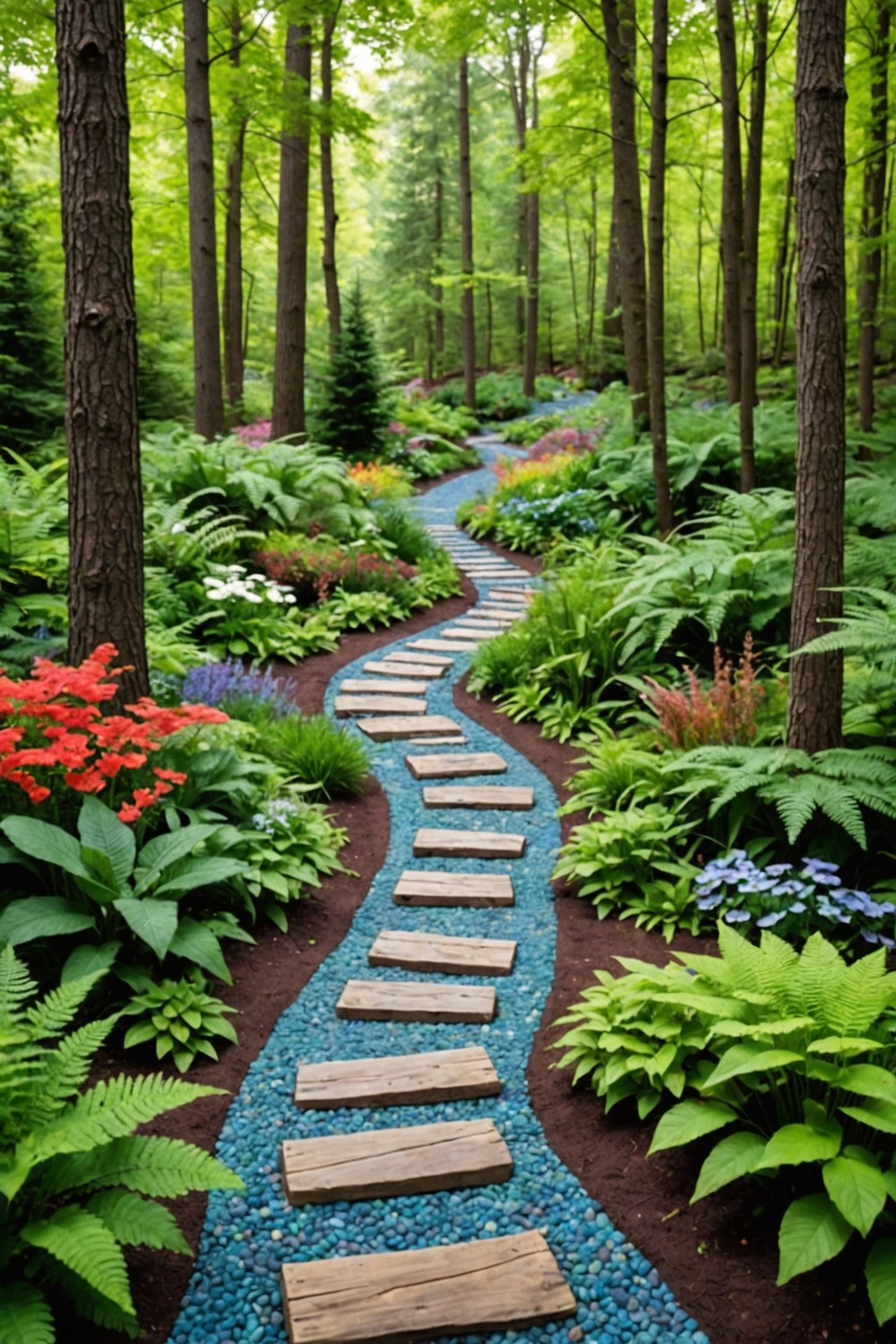
Using pebbles in a woodland garden adds texture and contrast, enhancing the natural beauty of the landscape. They can create enchanting pathways that guide visitors through the greenery, mimicking the look of a forest floor.
Pebbles also act as ground cover, helping to suppress weeds while retaining moisture in the soil.
Mixing various colors and sizes of pebbles can complement the plants and features in your garden, providing a rustic charm that blends seamlessly with the serene woodland environment.
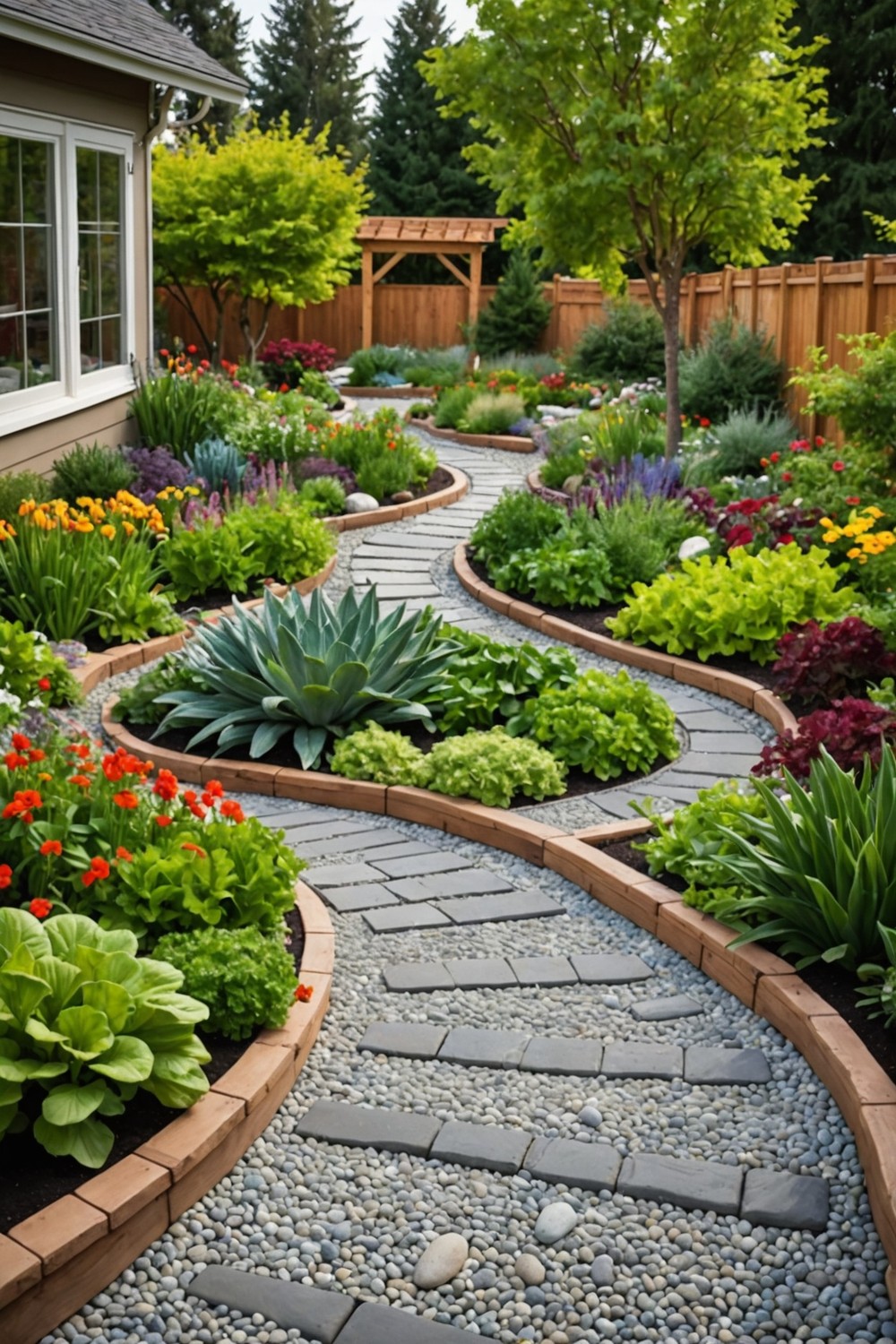
Designing a pebble vegetable garden combines functionality with aesthetic appeal. Start by selecting a sunny spot, ensuring plants receive at least six hours of sunlight daily.
Create raised beds bordered with smooth, flat pebbles to define the space and improve drainage.
A gravel or pebble pathway between the beds can facilitate easy access for maintenance. Incorporate drought-resistant plants alongside your vegetables to enhance visual interest and create a natural ecosystem.
Use vibrant pebbles to highlight specific areas, making the garden not just productive but also visually engaging.
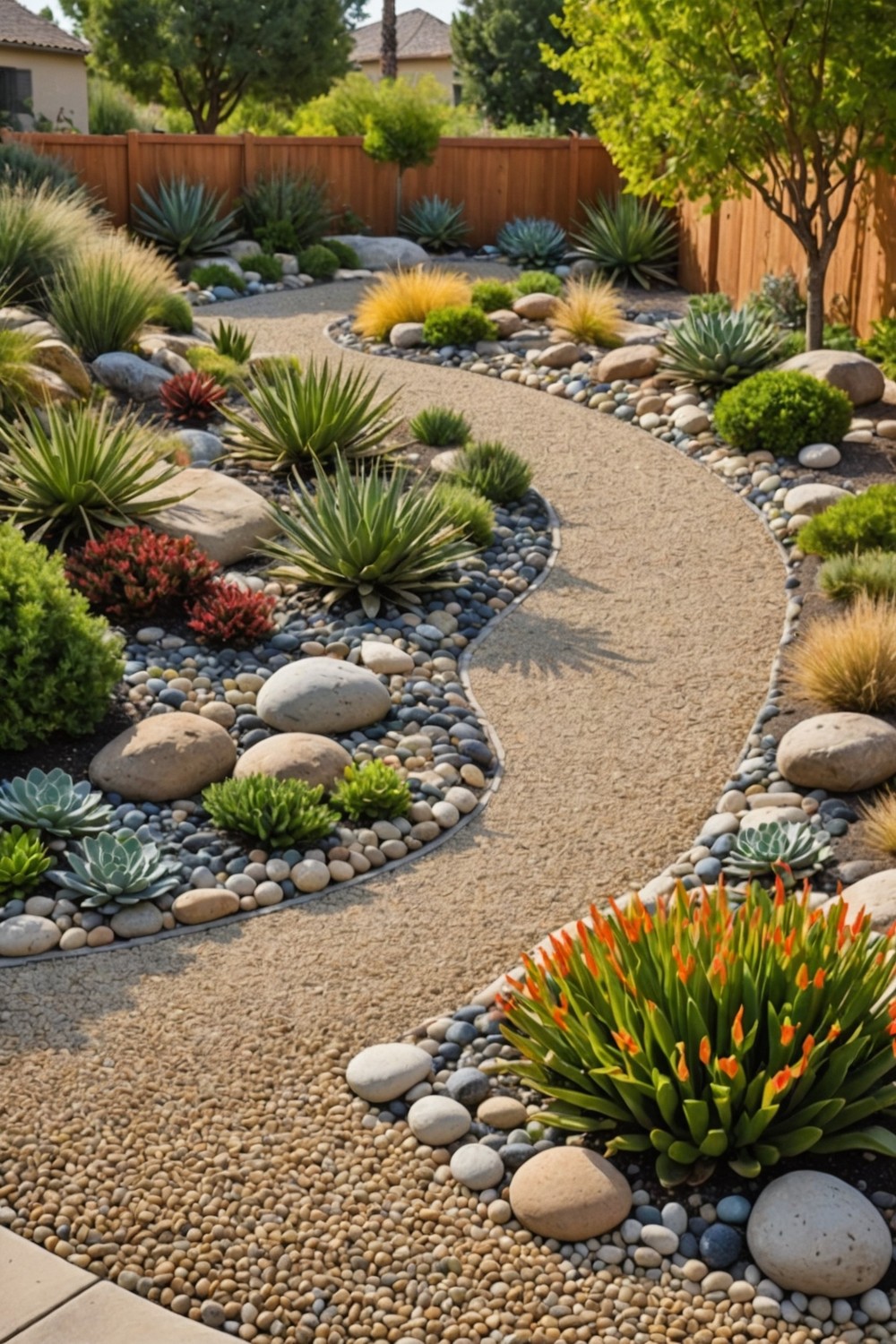
Creating a pebble and sand area can add a unique texture and aesthetic to your garden.
Begin by selecting a suitable space that allows for easy drainage and complements your overall landscape.
Start with a base layer of sand, which offers a cozy feel underfoot and helps with water absorption.
Lay down an even layer of pebbles on top to add contrast and visual interest.
You can incorporate larger stones to define borders or paths, enhancing the area’s functionality.
For a polished look, consider including drought-resistant plants to soften the hardscape while maintaining an easy-care environment.
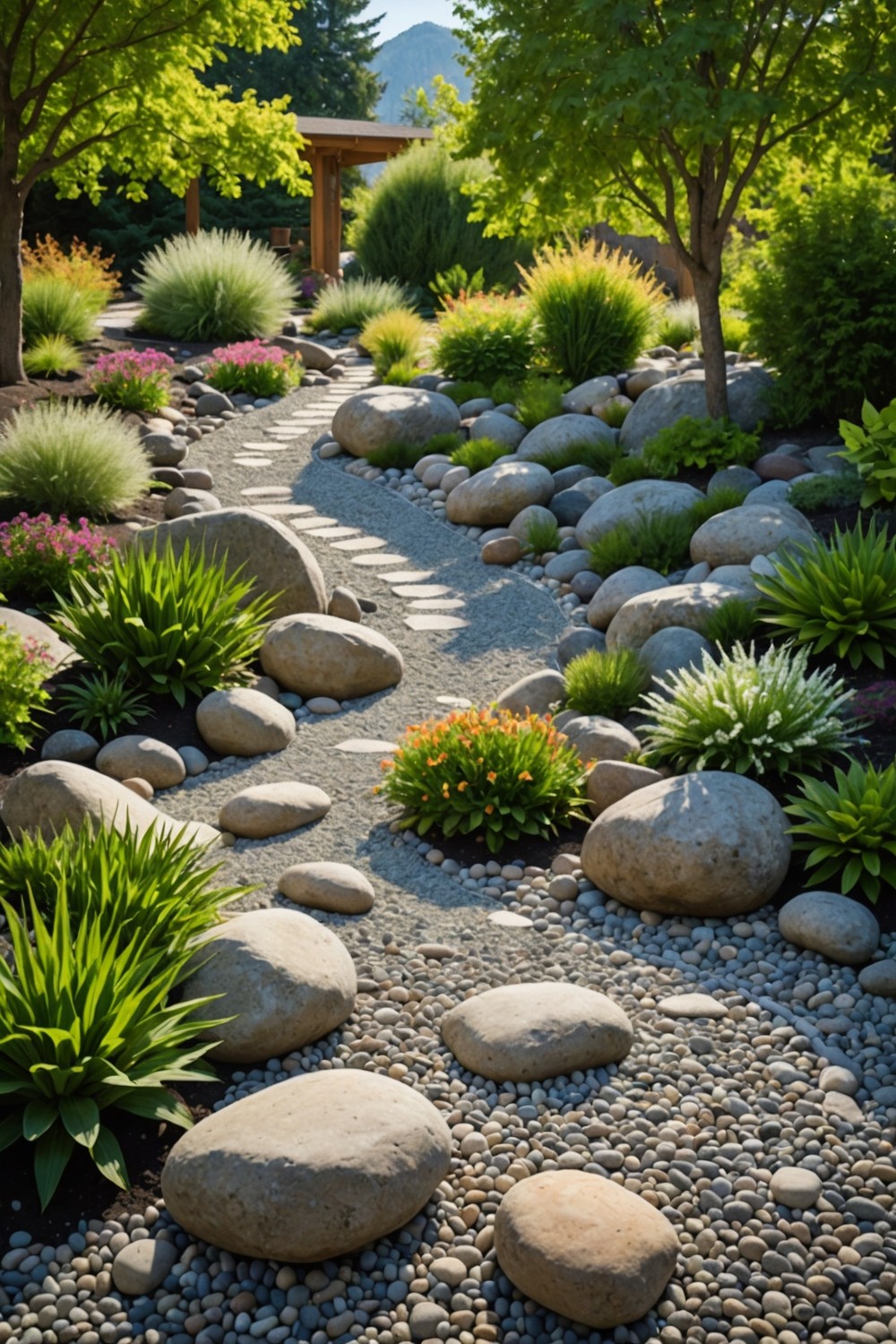
Incorporating large boulders with pebbles creates a visually striking contrast that enhances the natural beauty of your garden. By strategically placing boulders among the pebbles, you can create focal points that draw the eye and add depth to your landscape.
This combination not only provides texture but also helps stabilize the soil, reducing erosion around delicate plants.
Consider arranging the pebbles in varying sizes to complement the boulders, creating a more dynamic and inviting space.
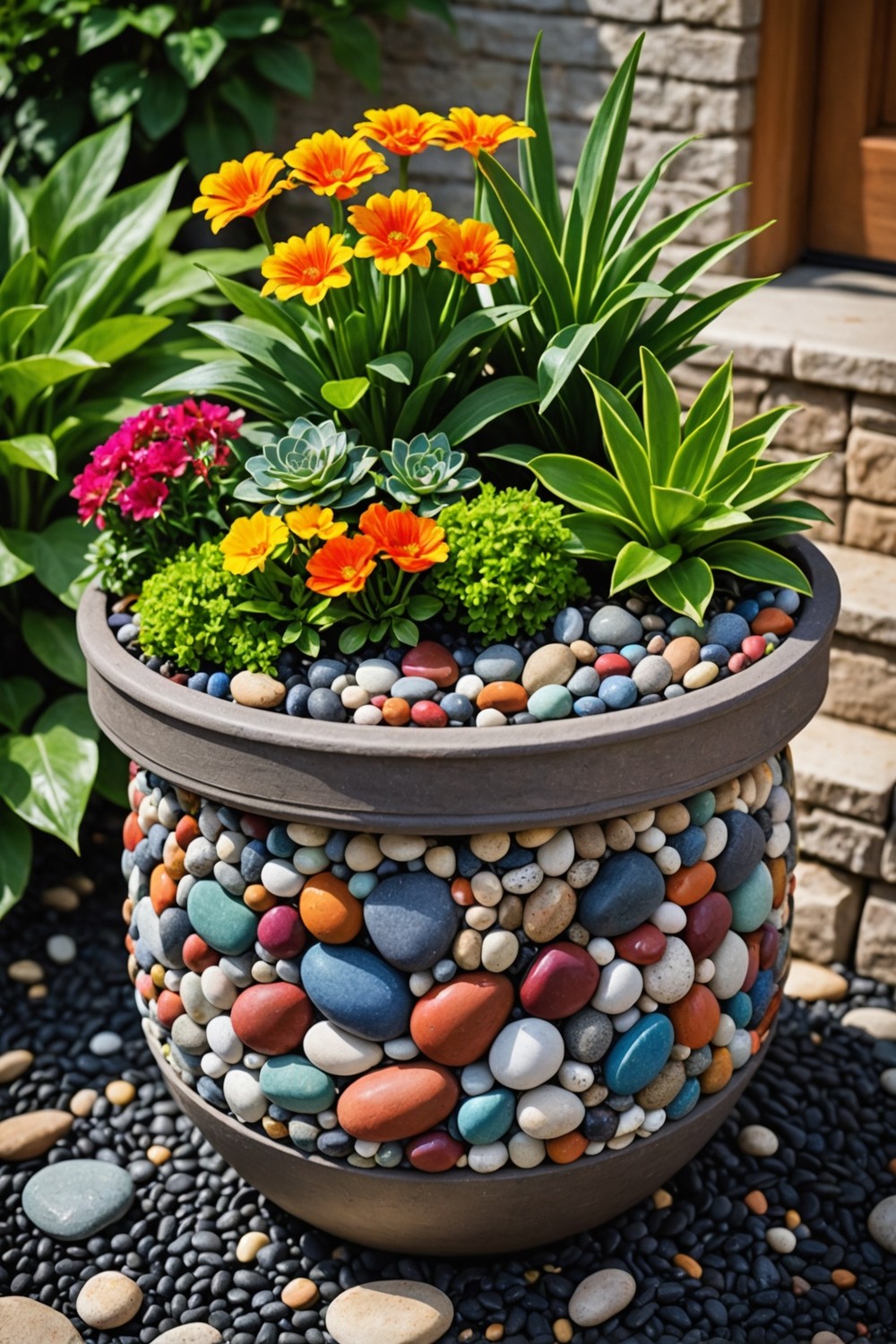
Using pebbles in ornamental planters adds texture and visual interest to your plants.
They can serve multiple purposes: improving drainage, preventing soil erosion, and enhancing the overall aesthetic of your arrangement.
By layering pebbles at the bottom of your planter, you ensure excess water drains away from the roots, promoting healthy growth.
Additionally, the varied colors and sizes of pebbles can complement the foliage and flowers, creating a stunning centerpiece for any space.
Experiment with different combinations to find the perfect match for your style!
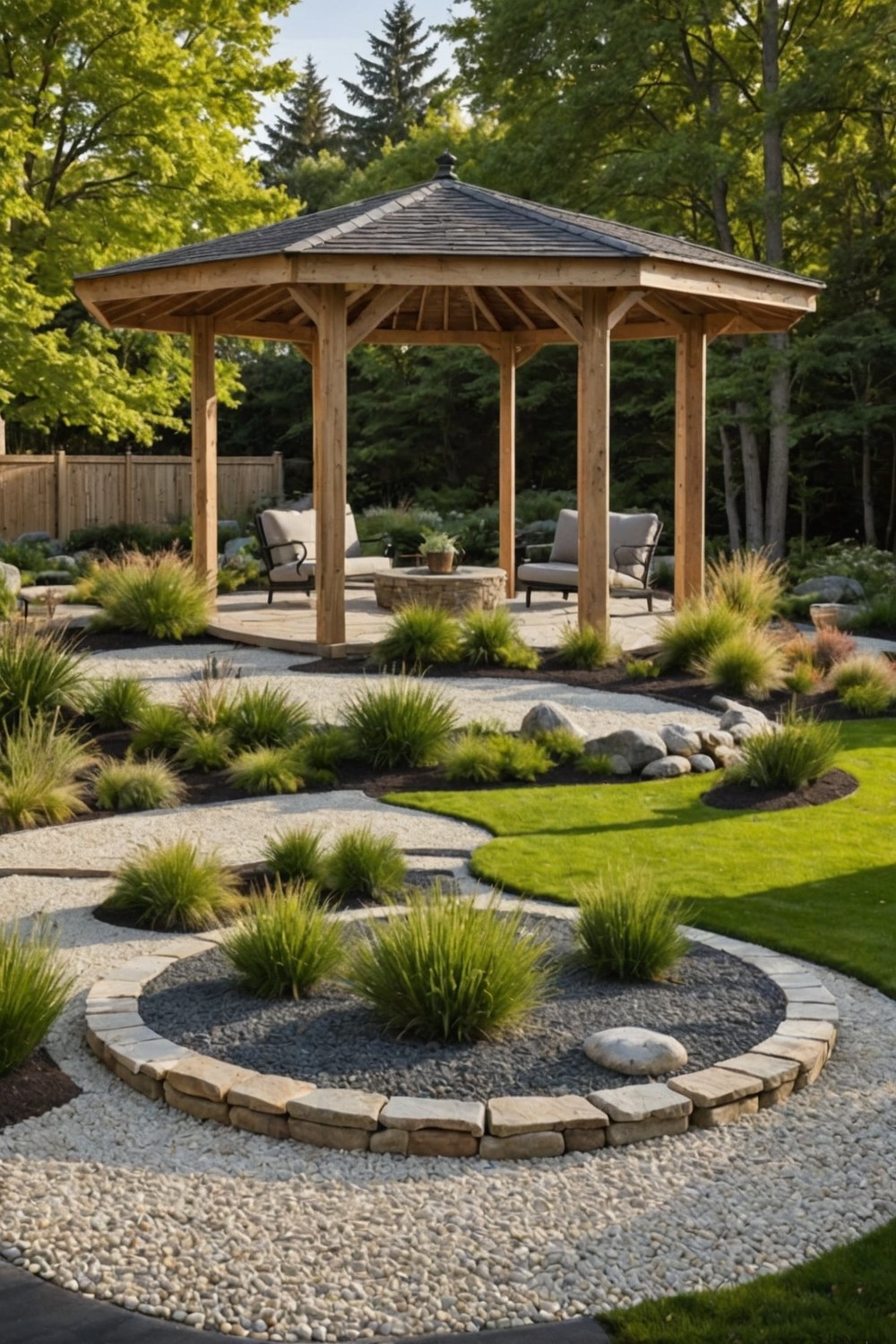
Constructing a pebble pavilion base starts with selecting a flat, well-drained area in your backyard. Clear the space of any vegetation and debris, then lay down landscaping fabric to prevent weeds.
Next, frame the pavilion’s shape with pressure-treated wood to create a sturdy outline.
Fill the interior with a mixture of pebbles, ensuring a consistent layer that’s compacted for stability. Finish by leveling the surface and adding larger stones around the edges for a clean, defined look.
This base not only enhances the pavilion’s aesthetic but also provides a functional outdoor gathering space.
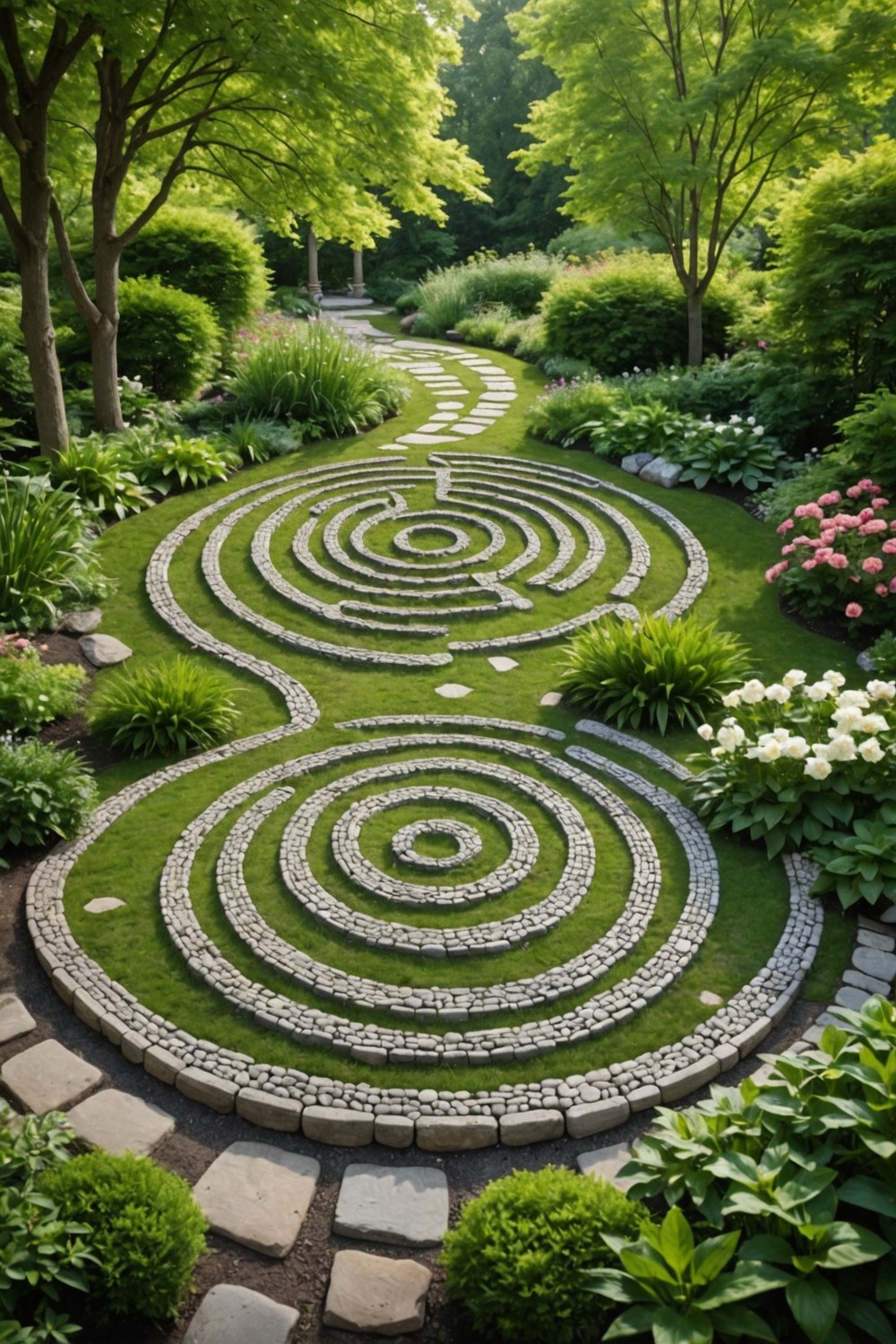
Creating a pebble labyrinth involves laying out a winding path that guides visitors through a serene meditative space.
Start by selecting a dedicated area in your garden, ensuring it’s easily accessible.
Use larger stones as boundary markers, then fill the pathways with smaller pebbles, forming intricate designs.
These playful patterns invite exploration while providing a sense of tranquility.
Incorporating plants along the edges can enhance the natural vibe, making it a perfect spot for relaxation or contemplation.
